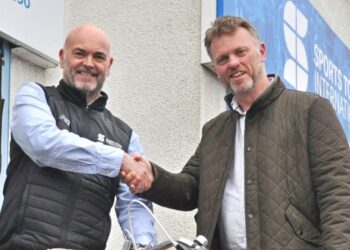
An innovative project aims to transform the dairy industry through collaborative working between farmers, academics and industry leaders.
The Digital Dairy Chain offers any business or individual involved in the dairy supply chain across Cumbria, South and West Scotland access to services to support productivity and efficiency.
The five-year project is funded by the Government’s UK Research and Innovation department and has a £21 million budget to provide grant funding to businesses and individuals with strong ideas.
The funding is shared between a group of 10 partners across the region, led in Cumbria and the south of Scotland by Scotland’s Rural College.
The project partners are focused on several themes aimed at uplifting the rural economy through the dairy sector, including developing digital connectivity, stimulating research, new product development, supporting business growth, attracting and retaining local talent and skills.
Rachel Cook is the project’s communications manager and says that bringing the best minds in the industry together is crucial to achieving their aims.
Rachel said: “This is a complex project, but it has the potential to improve the rural economy by transforming the dairy sector.
“We are passionate about linking the brilliant ideas of local farmers and dairy supply businesses with the academic institutions and industry partners that can make those ideas a reality.
“Any local business or individual involved in the dairy supply chain can apply for grants to support their plans but we’re also very keen to hear from other sectors with transferable technology.
“There have been so many fantastic ideas, including new product launches and initiatives to promote the benefits of working in the dairy sector. We need to recruit and retain young people who understand the importance of dairy in the region.”

One of the main pressures on the dairy industry is the need to build a workforce for the future, identifying the roles needed and where there are skills gaps.
The Digital Dairy Chain is working closely with the University of Strathclyde and the University of the West of Scotland as well as SRUC to develop new courses and graduate schemes that will help deliver the additional capacity needed across the dairy sector.
The project is also providing opportunities for manufacturers of dairy products to showcase, test and refine their new product ideas through the provision of maker spaces in Cumbria and Ayrshire.
The spaces will give producers of dairy products and dairy-based food and drink the chance to develop new products or move from small-scale kitchen creations into commercially viable production.
From cheese and yoghurts to milkshakes and ice cream, the space in Cumbria is provided by Appleby Creamery. The space enables local producers to gain feedback and expertise from the region’s leading manufacturers.
Rachel is married to a dairy farm manager and was inspired to join the project team when she arrived in Lockerbie with her husband five years ago.
“I just couldn’t understand what opportunities there were for local young people in such a rural area. Now I realise that there are multiple opportunities, they are just very different from the ones I understood coming from a big city like Glasgow.
“I was inspired by the challenges I knew my husband and his colleagues were experiencing, particularly around recruitment. The dairy sector is undermarketed.
“In the United States, they have such a vast dairy and agricultural sector that they actively promote dairy work through huge advertising and billboard campaigns.
“There is no stigma about rural working over there and that’s what we want it to be like here in the UK, where the dairy supply chain is just as important and critical to the agricultural sector as a whole,” said Rachel.
The inaugural Think Dairy Expo will take place at H&H Borderway Mart at Rosehill in Carlisle in 2024 and will be the UK’s first ever dairy careers event.
The Digital Dairy Chain project aims to generate £60 million a year in economic development for the region and create 600 new dairy jobs.
“If we succeed in these aims, it will attract increasing investment from bigger companies and help promote working in dairy as a rewarding and exciting career path.
“We know that the skills and innovation are here, we just need to help people understand how important this is and how much it could benefit the dairy sector, the wider rural economy, and the region as a whole,” said Rachel.










